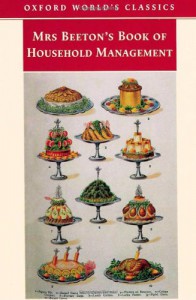Mrs Beeton's Book of Household Management (Oxford World's Classics)

In The Awakening we are prompted to sympathize with Edna Pontellier, who feels unfulfilled, a piece of property her husband owns. At one point in the book, Edna steps over a servant, a “quadroon,” and I thought, “What about her life?” In more books than you would suppose, the servants, the lower classes, are presented so fleetingly, they become invisible.
One of fascinating aspects of The Remains of the Day--both the book and film-- was how fully the lives of the servants were depicted. Underneath the whole hierarchy of power and etiquette above, the servants create their own hegemony and lives—lives that are rich with desires and disappointments.
This has little to do with the book at hand, Mrs. Isabella Mary Beeton’s The Book of Household Management, except that, like Remains of the Day it explores codes of conduct, albeit in a very practical manner. Here, though, Beeton focuses on the upper class and lays out—in very prescriptive terms—just how a young woman should manage her household (circa Victorian England). The book is fascinating. The other day, when I was reviewing Frances Burney’s Evelina, I described how Evelina embarrasses herself at a ball, by declining the first gentleman who asks her to dance and then accepting a second dance invitation, from a different man. We can tell—from the dialogue—she’s broken some rule, but it’s not really explained. Beeton provides the background:
In private parties, a lady is not to refuse the invitation of a gentleman to dance, unless she be previously engaged. The hostess must be supposed to have asked to her house only those persons whom she knows to be perfectly respectable and of unblemished character, as well as pretty equal in position; and thus, to decline the offer of any gentleman present, would be a tacit reflection on the master and mistress of the house.
The section on the duties of the mistress of the house are engrossing and provide a wealth of background to the rules of etiquette often unexplained in much of British 18th & 19th century fiction.
I learned that, as a blonde, I should wear pastels, as darker colors would overwhelm a fair complexion. Then, I should rise early, before the servants, to set an example and get the household affairs underway. Following breakfast, and after making sure the children are groomed and the household is in order, I may—without guilt—indulge in some harmless pleasures such as light literature, music and other “elegant arts.” By then, four hours will have elapsed, and it will be time for the luncheon, which should be a light meal, though its “solidity” depends on the amount of exercise I take and how late dinner will be served.
Following luncheon, I make my morning calls. This part baffled me. First, why are calls in the afternoon called “morning calls,” and if all the ladies are making these calls, who in the hell is home to receive their guests? Ah well, having made my morning calls, the “next great event of the day” is “The Dinner.” And tonight, I will be having guests, having sent out invitations—correctly worded—three weeks ago. I’ve given much thought to the seating arrangements as “to form a due admixture of talkers and listeners.”
The half hour before dinner is a moment of great stress. The way in which I conduct myself through this ordeal will mean I either pass with “flying colours, or, lose many of [my:] laurels.” During this time, I’m in agony—worrying about my guests arriving on time and whether the domestics and, most of all, the cook have done their best. However, I show no agitation, but engage in “light and cheerful topics of conversation” so that my guests are at ease.
…You get the point, and though this opening section provides directions for nearly any duty or occasion a the mistress of the house might encounter, it’s really only a small portion of the book. Beeton’s book—over 1,000 pages long—is insanely comprehensive. Following the detailed description of the Mistress’s duties, chapters on each servant are provided, followed by a few hundred pages on cooking. Beeton not only provides recipes but gives us lengthy histories of, perhaps, “the fish” as well as comments on its appearance, and all the ways we might prepare it.
The book ends with pronouncements on the care and feeding of children and a section on the legal ramifications of husbands, wives, and their households. For those interested in literature of this time period it is a treasure-trove, and Beeton’s tone throughout is engaged and practical.
Post script: I just read that Beeton started writing this book when she was 21 and then died, after completing it, when she was 28.




